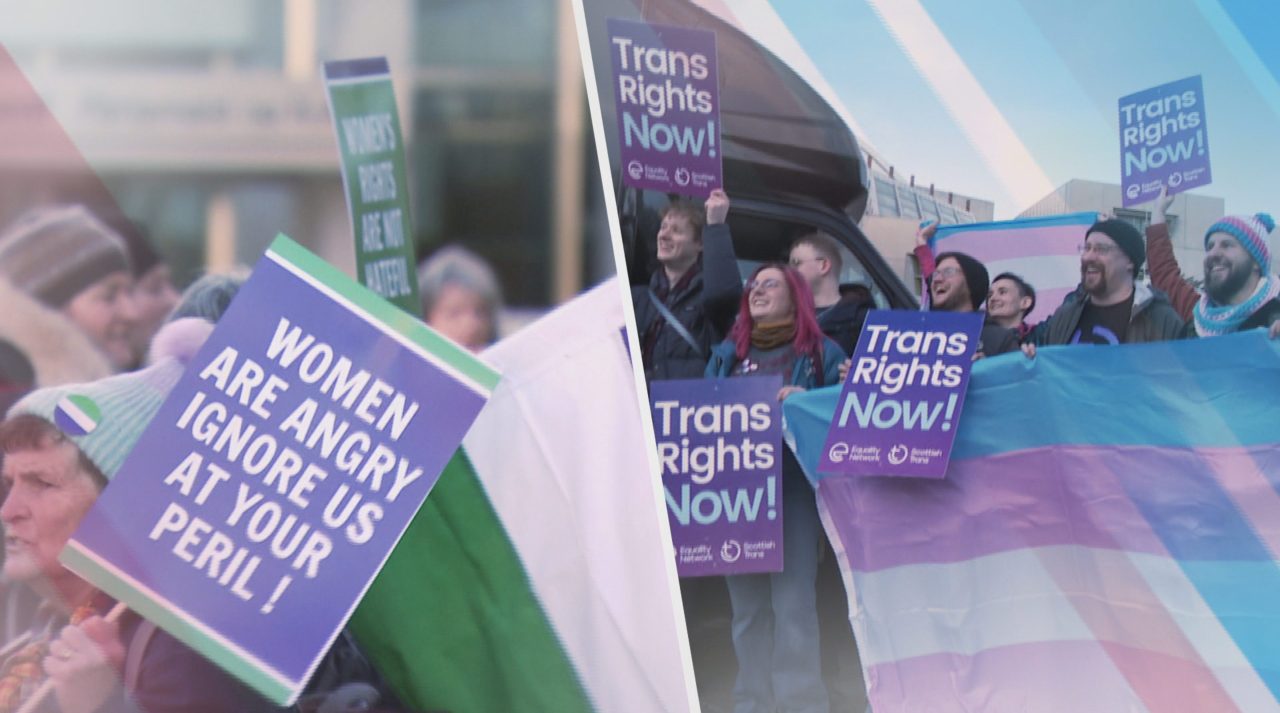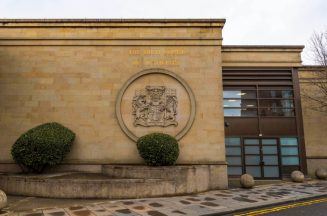Key Points
-
 Judges rule Westminster acted lawfully when it vetoed the Scottish Government’s gender self-ID reforms
Judges rule Westminster acted lawfully when it vetoed the Scottish Government’s gender self-ID reforms -
 Holyrood overwhelmingly passed the Gender Recognition Reforms Bill with cross-party support
Holyrood overwhelmingly passed the Gender Recognition Reforms Bill with cross-party support -
 But that was blocked by the Scottish secretary with a never-used-before Section 35 order
But that was blocked by the Scottish secretary with a never-used-before Section 35 order -
 Scotland’s First Minister Humza Yousaf launched the legal challenge which has cost the taxpayer at least £230,000
Scotland’s First Minister Humza Yousaf launched the legal challenge which has cost the taxpayer at least £230,000 -
 The Scottish Government could chose to take the fight all the way to the UK Supreme Court
The Scottish Government could chose to take the fight all the way to the UK Supreme Court -
 Trans rights activists describe the ruling as a ‘devastating day for equality’
Trans rights activists describe the ruling as a ‘devastating day for equality’ -
 The reforms were designed to streamline the process for people to obtain a gender recognition certificate – the official route to changing your legally recognised sex
The reforms were designed to streamline the process for people to obtain a gender recognition certificate – the official route to changing your legally recognised sex -
 Critics argued it could compromise the safety of single-sex spaces for females
Critics argued it could compromise the safety of single-sex spaces for females
A landmark court ruling has upheld the UK Government’s unprecedented veto of the Scottish Parliament’s gender self-identification bill.
In a major blow to the Scottish Government, the Court of Session on Friday dismissed its appeal against Westminster’s decision to override MSPs and axe the bill.
Lady Haldane’s judgment represents a win for the UK Government at a time when it has been accused by the SNP of intruding on devolved areas.
The controversial Gender Recognition Reform (Scotland) Bill was voted through by the Scottish Parliament with cross-party support in December 2022 by 86 votes to 39.
The legislation is designed to streamline the process for people to obtain a gender recognition certificate – the official route to changing your legally recognised sex.

In January, Scottish secretary Alister Jack used Section 35 powers from the Scotland Act 1998 – the legislation that established the Scottish Parliament – for the first time to stop the bill receiving royal assent.
He argued that the legislation would adversely impact the UK-wide 2010 Equalities Act which sets out protections for groups including women and transgender people.
Scotland’s First Minister launched the legal challenge after he became First Minister in March, describing the move as an “undemocratic veto”.
Following the ruling, Humza Yousaf said the judgement confirmed “beyond doubt that devolution is fundamentally flawed”.
“The Court has confirmed that legislation passed by a majority in Holyrood can be struck down by Westminster,” he said.
“The only way to guarantee we get true self-government is through independence.
“This is a dark day for devolution. Sovereignty should lie with the people of Scotland, not a Westminster Government we didn’t vote for with the ability to overrule our laws.
“We, of course, respect the Court’s judgment and will take time to consider its findings.”
Nicola Sturgeon – who was first minister when the bill was passed – labelled Westminster’s block a “full-frontal attack” on Scottish democracy.
During court proceedings in September, Lord advocate Dorothy Bain – Scotland’s top law officer – argued that Jack had “no reasonable grounds” to block the bill.
She said that because the reforms would only change the process of getting a gender recognition certificate – rather than the real effect of the certificate itself – it had no impact on equalities law.
She warned that a successful ruling in the UK government’s favour could mean Westminster “could veto practically any act of the Scottish Parliament having an impact on reserved matters because he disagreed with it on policy grounds”.
“That would be tantamount to the Scottish Parliament being able to legislate only insofar as the UK executive consented,” she said.
David Johnston, who was acting on behalf of the UK Government, dismissed the idea that the Scottish secretary’s use of a Section 35 order was unconstitutional.
He said the power is part of the “very structure of devolution” and added that it would be “highly problematic” to have two different systems of gender recognition within the UK.
He said Jack was correct to scrutinise the Holyrood bill to “protect the interests of the United Kingdom if he identifies adverse effects on the operation of law as it applies to reserved matters”.
The Scottish Greens described it as a “devastating day for equality”.
The Scottish secretary said he welcomed the ruling.
He told STV News: “I’m obviously very pleased that the decision I took has been vindicated.
“I’m very pleased that the Section 35 order that has never been before is clearly cemented into the Scotland Act of 1998 and I’m pleased also that the judge agreed with me that there were adverse effects on GB-wide legislation relating to equalities.”
The Scottish Government said it “notes the judgement” and will “consider its terms”.
What happens next?
The ruling is likely not the end of the matter.
The Scottish Government has the right to appeal the decision at the Supreme Court.
That will be a choice for Scottish ministers to make but is expected to be announced soon.
Taxpayers have already shelled out £230,000 for costs on the Scottish Government’s side.
What does this mean for devolution?
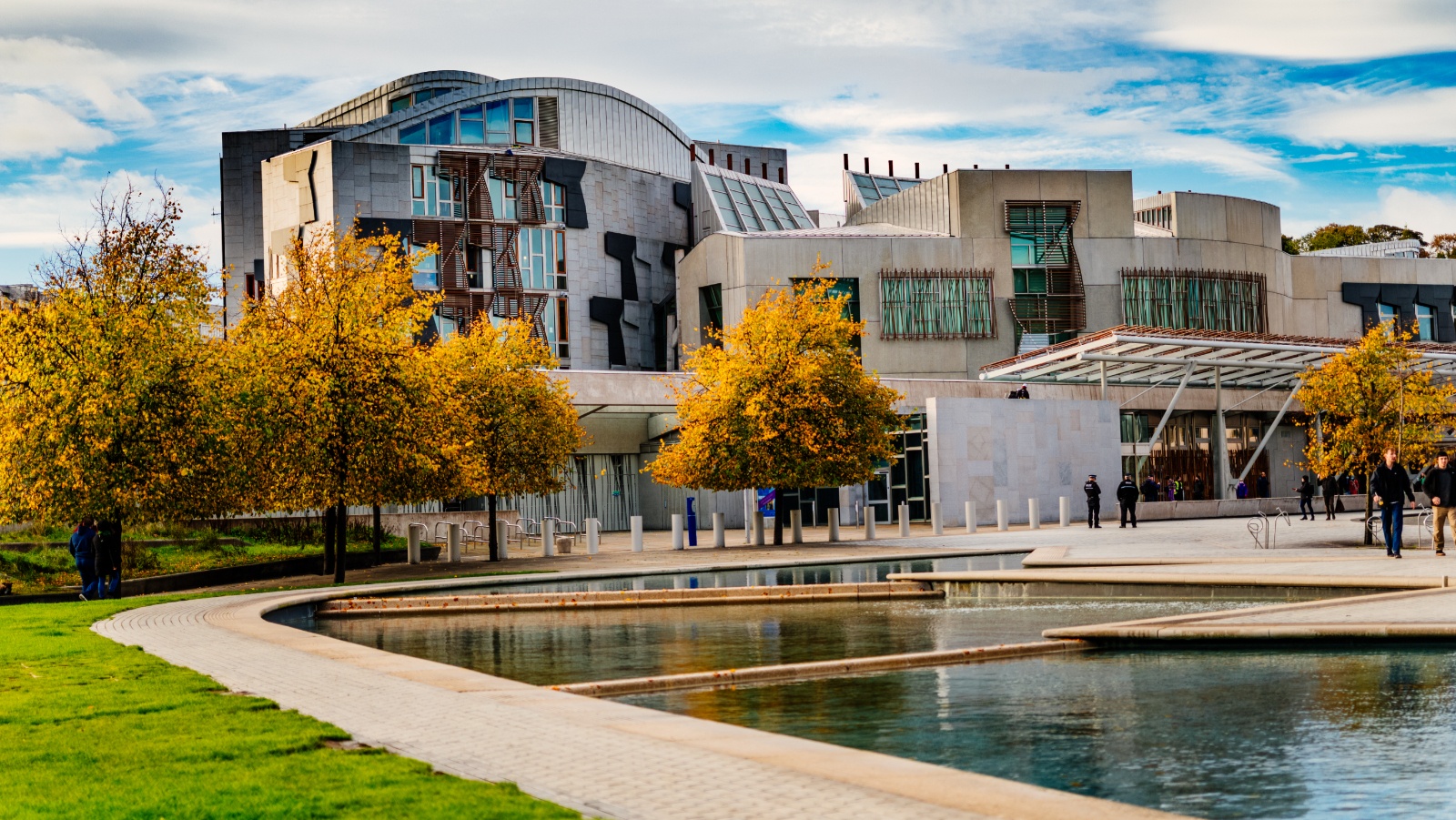 iStock
iStockWhen Alister Jack issued a Section 35 order to block the gender reforms bill it was the first time in history it had been used.
Friday’s ruling – as well as any future rulings – could test the limits of the power as Holyrood and Westminster increasingly spar over the constitutional arrangement.
In theory, it could give the UK Government more confidence in the future over which devolved bills it can and cannot strike down.
It could also give the Scottish Government a better indication of which bills are likely to be subject to a veto.
The SNP argues that Westminster has become increasingly keen to involve itself in what it sees as devolved matters.
That includes issues such as the refusal to grant the Scottish Government an exception to the Internal Markets Act for the deposit return scheme.
That led to the ultimate collapse of the scheme in its current form.
In October, the Scottish secretary said the era of allowing the UK Government’s role in Scotland to “fade into the background” is over.
“Today I can announce the era of devolve and forget is well and truly over,” he told party members as he accused the SNP of “undermining” devolution.
“It is dead. It is finished. And I promise you, it is not coming back under my watch.”
Lady Haldane’s ruling follows a major defeat for the Scottish Government last November when the UK Supreme Court ruled the Scottish Parliament did not have the power to hold a second independence referendum without the consent of Westminster.
What does this mean for trans people?
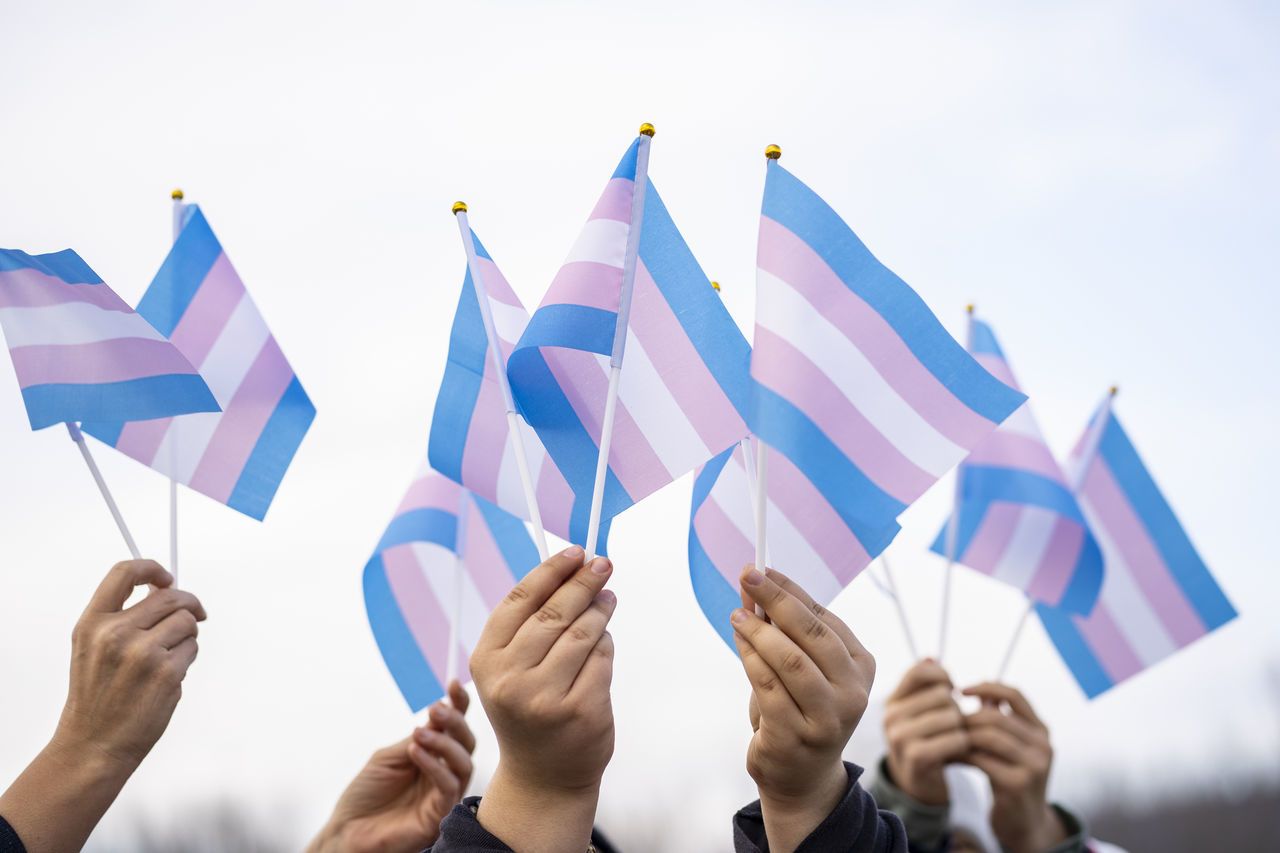 iStock
iStockThe legal battle effectively means current reforms to the way in which transgender people can change their legally recognised sex are stalled.
Most political parties agree that reform is needed.
Although there is a lot of disagreement – both between and within parties – over what that should look like and how far it should go.
If the Scottish Government takes the issue all the way to the Supreme Court and loses it will need to come up with new legislation to reform gender laws that fall within the devolution settlement.
For the time being, the current process around changing one’s gender is likely to stay as it is.]
‘A devastating day for equality’
The Scottish Greens described the ruling as a “devastating day for equality”.
“It is a democratic outrage, crushing basic rights and equality for some of Scotland’s most marginalised people,” MSP Maggie Chapman said.
“It shows the huge limitations and constraints on devolution and confirms that the UK Government refuses to see our trans siblings for the people they really are.
“It is horrible, it is heartbreaking and it is unjust. It makes a mockery of any vote or decision that we as parliamentarians take at Holyrood from now on, if the result is knowing that Westminster will veto anything they don’t like.
“Self-ID is normal and is used in countries around the world. What our Parliament voted for was a small change that would have made a big difference to a vulnerable community. I hope the Scottish Government will consider all options for appeal.”
LGBT charities said they were disappointed with the result.
Colin Macfarlane, director of nations at LGBTQ+ charity Stonewall, said: “We’re disappointed that the Court of Session in Scotland has found in favour of the UK Government’s unprecedented decision to use Section 35 to block the Gender Recognition Reform Bill from royal assent.
“This Bill was one of the most debated in the Scottish Parliament’s history and was passed by a resounding majority of MSPs drawn from all major Scottish parties.
“This unfortunately means more uncertainty for trans people in Scotland, who will now be waiting once again, to see whether they will be able to have their gender legally recognised through a process that is in line with leading nations like Ireland, Canada and New Zealand.
“Whatever happens next in discussions with the UK and Scottish Governments on this matter, Stonewall will continue to press all administrations to make progress on LGBTQ+ rights in line with leading international practice.”
Vic Valentine, Scottish Trans manager, said: “The Gender Recognition Reform (Scotland) Bill would significantly improve the process that trans men and women in Scotland use to update the sex recorded on their birth certificates so that at important moments of their lives, such as registering to be married, they would be able to show a document that reflects who they truly are.
“The GRR Bill is important to trans people, and the court judgement is clear that it is not about the merits of the bill. Nor was the judgement about whether the UK Government made the right decision, or considered all the evidence, in blocking the bill. In our view they did not. The judgement is simply about whether the UKG has the power under section 35 of the Scotland Act, to block it, and the court has concluded that they do.”
“We are really concerned that this judgement, if left unchallenged, means that trans people will continue to have to use the intrusive, unfair and expensive process for being legally recognised as who we truly are that a majority of MSPs voted to significantly improve last year – and so we urge the Scottish Government to appeal.”
What does this mean for women’s rights?

Some women’s rights groups will celebrate this battle.
They have raised concerns about the impact the Gender Recognition Reform (Scotland) Bill would have on single-sex spaces for females.
Critics have claimed that predatory men could obtain a gender recognition certificate under a self-ID model in order to gain access to female-only spaces.
The UN’s special rapporteur on violence against women and girls has said the reforms could allow violent males to “abuse” the system.
Author JK Rowling, a staunch campaigner against the bill, said: “All a man needs to become a woman is to say he’s one.”
What is in the bill?
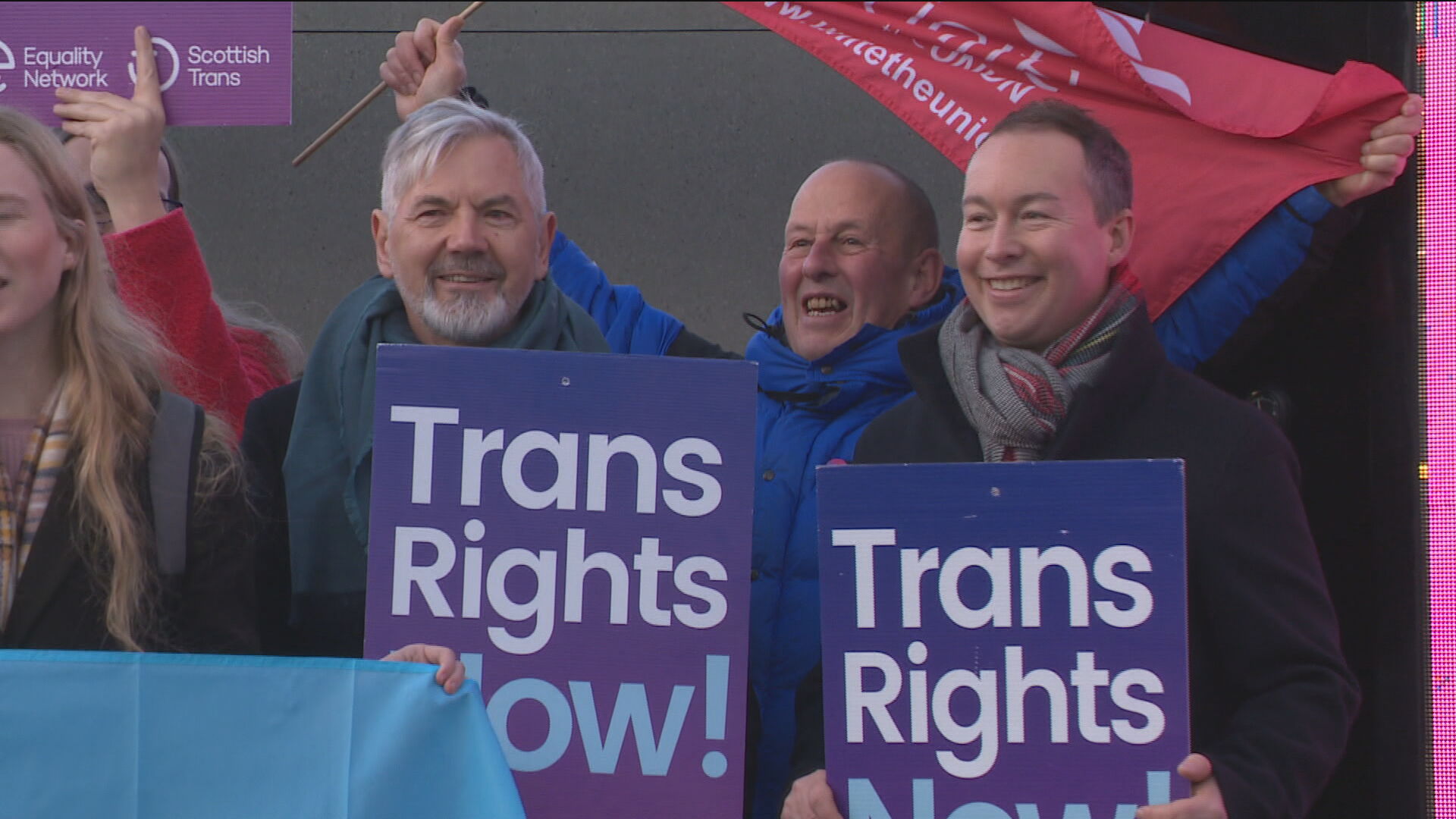 STV News
STV NewsUnder the reforms, the age limit for applications for a gender recognition certificate would be lowered from 18 to 16.
A requirement for a medical report, including a diagnosis of gender dysphoria, would also be dropped.
Applicants for a certificate would have been required to live in their acquired gender for three months (six months for 16 and 17-year-olds) – down from the current requirement of two years.
In essence, the process would change from a medical one to a one in which someone can “self-ID”.
It would then become much easier for a person to change their legally recognised sex as the entire process becomes much less arduous.
Follow STV News on WhatsApp
Scan the QR code on your mobile device for all the latest news from around the country


